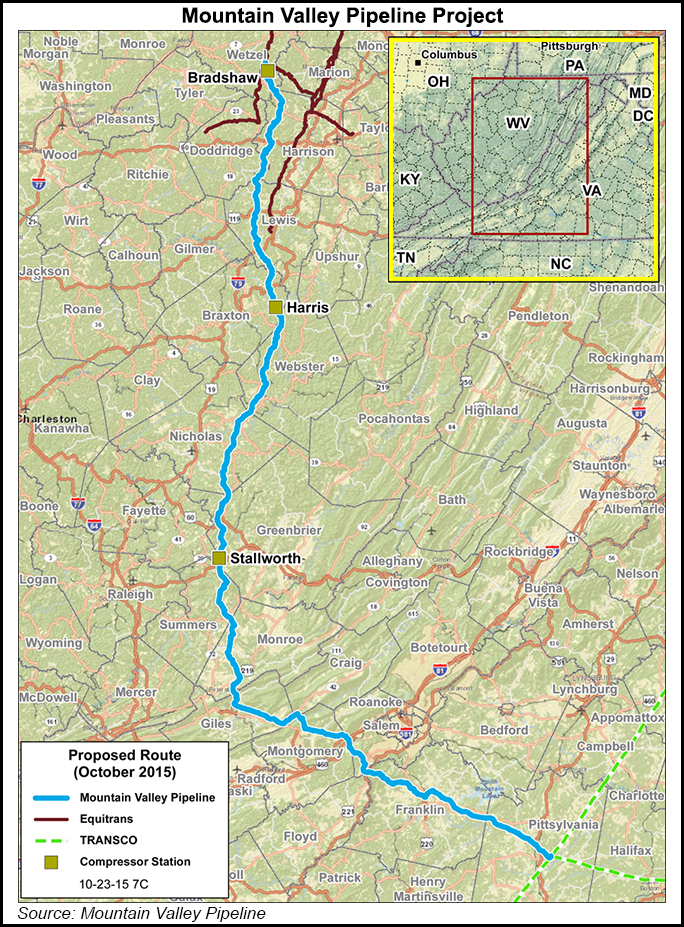Regulatory | NGI All News Access
West Virginia Reevaluates MVP; Another WQC Shot Down
In yet another sign of the growing challenges natural gas pipelines face at the state level, the West Virginia Department of Environmental Protection (WVDEP) has thrown out Mountain Valley Pipeline’s (MVP) Section 401 water quality certification (WQC) and plans to reevaluate the project’s application.

It’s unclear how the agency’s move might affect the 2 Bcf/d pipeline’s projected in-service date, which is expected late next year. MVP spokeswoman Natalie Cox said the company is still targeting a full in-service date of 4Q2018. The project would move Appalachian shale gas to the Mid-Atlantic and Southeast. Sponsors did not say how the schedule may be affected.
In a letter last week to the U.S. Army Corps of Engineers, WVDEP said it was vacating and remanding MVP’s certificate to determine if the application is in compliance with Section 401 of the U.S. Clean Water Act.
The agency has until next week to file a response brief in the U.S. Court of Appeals for the Fourth Circuit, where five environmental groups filed a petition for review of the WVDEP’s March decision to issue the certificate. The groups argue that the agency ignored the project’s threats to the state’s environment.
WVDEP spokesman Jacob Glance said during a review of the petition it was determined that the information used to issue the certificate needed further evaluation. The agency decided to vacate the decision “out of an abundance of caution, and to ensure that all aspects of the potential environmental impact of MVP are considered,” he said. WVDEP plans to act on the certification once that evaluation is complete.
The decision is the latest outcome from environmental groups’ efforts to frustrate shale gas infrastructure. New York state has unabashedly challenged natural gas projects, claiming its environmental review standards are among some of the toughest in the nation. New York has denied WQCs for the Northern Access expansion project, Constitution Pipeline and the Valley Lateral Project.
The state has successfully defended its decision in litigation of the Constitution case, is battling Northern Access in court and has cited a recent opinion from the U.S. District Court for the District of Columbia in denying a WQC for the Valley Lateral. As a result, environmentalists have been emboldened to try for the same results in other states, threatening a domino effect of sorts.
“Where we’ve seen a lot of hurdles is really not at the federal level, but certainly at the state level and New York has been more of the current issue,” said BTU Analytics LLC analyst Marissa Anderson. “But the fact that this happened I think is indicative of where challenges for these pipeline projects lay.”
Indeed, Virginia also expanded its review of the Atlantic Coast Pipeline (ACP) and MVP in July after environmentalists charged state regulators hadn’t gone far enough in vetting the projects’ WQC applications.
MVP’s sponsors said only that they’re willing to cooperate with WVDEP to determine if the project’s WQC complies with federal requirements. Glance said MVP’s stormwater general permit has also been suspended for “proper consideration and response to all comments received.”
The environmental groups for now have no plans to stop pursuing the petition for review. The appeal was filed by Appalachian Mountain Advocates on behalf of the Sierra Club, West Virginia Rivers Coalition, Indian Creek Watershed Association, Appalachian Voices and the Chesapeake Climate Action Network.
The groups welcomed WVDEP’s decision as a “positive step,” citing their opposition to the use of hydraulic fracturing (fracking) to extract gas resources.
“Recent court decisions have upheld states’ rights to stop these harmful fracked gas pipelines and we expect that to be true in future cases as well,” said Sierra Club spokesman Doug Jackson. “As far as the review goes, we are continuously evaluating our options on this and other projects.”
“The fracked gas Mountain Valley Pipeline is dirty, dangerous and needlessly endangers West Virginia’s waterways, wilderness and communities, and it should be rejected,” said the Sierra Club West Virginia Chapter’s Justin Raines. “This project should never have been approved in the first place, and we hope this pipeline now receives the scrutiny it deserves.”
The 300-mile MVP would originate in Wetzel County, WV, and move gas to an interconnect with the Transcontinental Gas Pipe Line in Virginia. The Federal Energy Regulatory Commission issued a favorable final environmental impact statement for the project in June, and it is expected to receive a certificate this fall. MVP would traverse roughly 200 miles of West Virginia, crossing 631 miles of stream and more than 400 wetlands.
As the project nears federal approval, along with ACP, a coalition of opposition groups and landowners filed a complaint last week in the DC Circuitto stop them.
© 2024 Natural Gas Intelligence. All rights reserved.
ISSN © 2577-9877 | ISSN © 2158-8023 |
